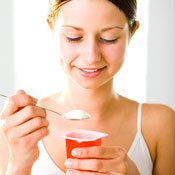It all started with a cold, then a cough. By the time I saw my physician, who was more than happy to share her "if-you-had-seen-me-sooner" lecture, I realized that even with a hefty antibiotic dose, an inhaler and other medicinal potions, this gunk had taken hold of my physical being. I was sicksicker than I had been for a long time.
I'd overheard conversations in the grocery store about sick kids and spouses. Colleagues expressed sympathy even as they gingerly moved away.
"There's some nasty stuff going around," they said.
Yet somewhere between snorting the Advair disc and downing a few OTC meds, I realized how healthy I had felt before I got sick. Not just wellhealthy. Weeks before I succumbed to this illness, I had been in Greece for most of the summer eating a daily regimen of ridiculously thick Greek yogurt and local honey.
Hmmm ...
As I was recovering, a physician acquaintance of mine said that she and her husband, also a physician, had been partaking of probiotic dairy drinks daily and hadn't been sick in two years.
Probiotics are not antibiotics. Probiotic means "for life." The World Health Organization defines probiotics as "live microorganisms, which when administered in adequate amounts confer a health benefit on the host" beyond nutrition. In other words, these are bacteria introduced into the digestive tract that provide health benefits. Scientists have identified more than 400 different probiotic strains, the most common of which are Lactobacillus, Bifidobacterium and non-pathogenic strains of Streptococcus.
Are probiotics new? The word, yes; the concept, no. We used to live in a dirty world. Humans ingested bacteria from the soil where they grew food and from animal's unpasteurized milk. Now farmers grow food in soils devoid of these bacteria, and with all our disinfectant products, we're purposely wiping out the beneficial bacteria we ingested naturally in the past.
Probiotics are trendy in the United States right now, but other cultures, from ancient Greece to modern-day Japan, have endorsed certain foods to produce beneficial results. Kefir, a Turkish word meaning "good feeling," is a fermented milk drink. It is believed that the prophet Mohammed gave the residents of the northern Caucasus Mountains grains of kefir to make a fermented "health" drink more than 1,400 years ago.
In this country, actress Jamie Lee Curtis is a spokeswoman for Activa, a Dannon Company product, promoted to "help regulate the digestive system." But not all probiotics have the Activa end result.
How do these other types of probiotics work? The key is balance. Research suggests that they help promote immunity in the digestive tract. The idea is to crowd the room with faces you do know so that strangers, some of whom may be violent, can't get into the room. This room, the digestive tract, is already filled with a complex system of 100,000 billion "good" and "bad" bacteria. By introducing good organisms into the gut, they out-populate the bad ones. And without the dangerous strains, the human host stays healthy.
To deliver probiotics, you need either a dry or refrigerated environment. Yogurt has a high water level, but refrigeration sustains the viability of its probiotics. Dairy products have also shown to balance the stomach's high acid content, which can harm probiotics.
Researchers have and are being conducting studies to prove or disprove the many health claims suggested by probiotic products. These studies have their own problems, however. As Dr. Mary Etta Moorachian, professor of Nutrition at Johnson & Wales University, clarifies, "Much of the challenge is related to the fact that in human trials, people are alike but still heterogeneous."
So more studies will be done. But the real proof may be in the pudding, er, yogurt. Years ago in Hong Kong, I got suckered into drinking a glass of snake gall bladder wine.
"This will keep you healthy for a year," the snake bleeder claimed. I didn't think that much about it at the time, and downed the substance. I didn't realize until 14 months later that I had not caught even one cold.
Probiotic Products
• Refrigerated Dannon products include Activa and DanActive, a probiotic dairy drink that claims to help "strengthen your body defenses." This product contains L. casei Immunitas, a trademarked culture.
• In yogurts, look for the "live active culture" label.
• Stonyfield adds a bevy of helpful bacteria to their yogurts: Lactobacillus rhamnosus, L. bulgaricus, Streptococcus thermophilus, L. acidophilus, Bifidus, L. casei and L. rhamnosus.
• Horizon Organic Dairy includes lactobacillus acidophilus and bifidobacterium in all its yogurt and cottage cheese products.
• Applegate Farms launched a yogurt cheese with probiotics last August.
• Although it's more difficult to create a longer shelf life environment, some dry probiotics products do exist. Vive is a cereal by Kashi, a company owned by the Kellogg Company, and recently Vidazorb, a line of chewable probiotic products, was released in the United States. More than 100 companies in the United States market probiotic products in supplement form.



Comments
Use the comment form below to begin a discussion about this content.